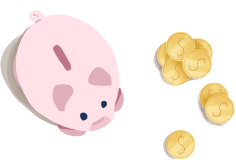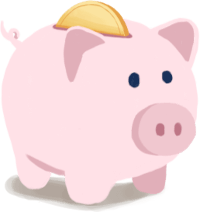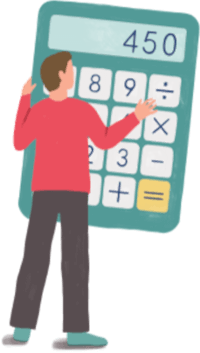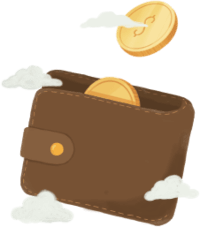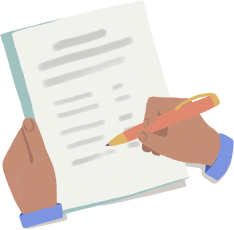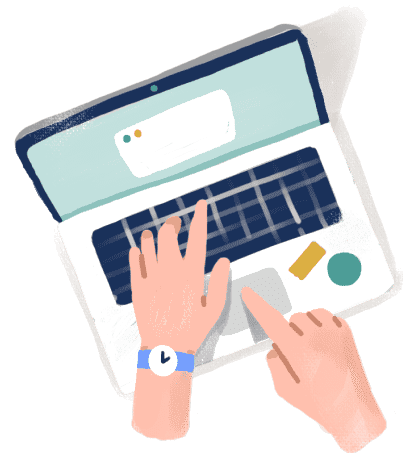Everything you need to know about keeping your money safe.
In ten minutes or less. Disclaimer: This is not financial advice.
Chapter 1
Where Does It Go?
If you’re getting a paycheck, the funds are probably going into a checking account at a bank or credit union.
A bank is typically a more ‘corporate’ structure designed to make as much money as possible. A credit union is a member-owned nonprofit cooperative. Credit unions are usually a friendlier experience, but they don’t always have the resources to have a great web experience or app.
You might think that all your money just goes into a big vault and stays there, but that is not the case. The bank keeps some of their clients’ money on hand, but a large portion of the money is invested and loaned out.
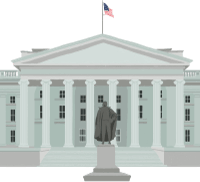
One of the most common ways banks currently make money on your money is by investing in treasury bills – one of the safest investments from the government. They’re at around 5% APY right now, meaning a bank makes $500 each year for every $10,000 they invest.
That means they’re making money off of you as a customer. And that means you should never pay your bank any fees.
Go check right now - are you paying a checking account fee? Certain banks charge you a fee if you don’t meet their account minimum requirements. We don’t like those banks.
When you can, keep your money in a place that doesn’t charge you money. Because they’re already making enough of it.

There are a bunch of banks right now offering sign up bonuses. If you’re thinking about opening a bank account, consider getting paid for it. We are not getting paid for this mention.
Chapter 2
The Basket
If you’re keeping all of your money in a checking account, you’re making a couple questionable decisions. The first is best described by the proverb “don’t keep all your eggs in one basket.” In other words, don’t only open an account at one bank. Have a backup. Or, consider splitting your money between a few different places.
Imagine what would happen if one of your banks had some technical issues one day – would you be able to buy what you needed? If not, then make a backup plan. As long as you’re not incurring any fees, you should be fine.
Now, for the second questionable decision: keeping all your money in a checking account. Checking accounts are fine, but they typically do not reward you. If you want to be paid by your bank to keep your money there, you want a savings account.
While a checking account is made for daily expenses, a savings account is designed for holding onto money over a long term. Savings accounts can come with restrictions on the number of withdrawals, lack a debit card feature, and do not allow check-writing. Instead, they offer the benefit of accruing interest, which increases the account balance overtime.
You can usually get your savings account from the same bank, but you should make sure they’re paying you something substantial…
Chapter 3
How Much Should I Expect?
The sad truth is that the vast majority of banked individuals store their funds in savings accounts that offer little to no annual yield. Banks profit immensely off this practice, and take advantage of the lack of financial literacy in the United States. Bank of America, for example, offers a Savings account with 0.01% APY.
You don’t need to settle for this. Any decent bank will offer you a high yield savings account (HYSA) with at least 4% APY – that’s a 400x difference.
For example, if you have $10,000 in a savings account, Bank of America would give you $1. A competitor offering 4% would give you $400 per year to keep your money in their account.
There is no significant difference between these options, besides the fact that Bank of America is profiting off your savings and not sharing it with you, while the competition is sharing.
Savings accounts are not investments - they’re just bank accounts designed to store money without tying it up in funds or CDs. You can remove your cash at any time, without liquidating assets or paying fees. It’s one of the safest ways to make money.

A certificate of deposit, or CD, is a type of account offered by banks where you can get a higher return on your funds in a relatively safe way. The downside is that you’ll have to lock your money up with your bank, and will be penalized if you take it out. That’s why most folks prefer a HYSA, especially for their emergency fund.
Historically, high yield savings accounts have been largely ignored because they did not offer any real return on capital. But with the changing interest rate environment, APYs have skyrocketed. And banks are passing this benefit onto you.
Chapter 4
Paying For Things
For better and worse, the world is moving away from physical cash. That means, more than ever, you’re making purchases with either a debit or credit card. Since a debit card is attached to a bank account, we’re gonna do a brief explainer.
The nice thing about paying for something with a debit card is that it’s very straightforward. You swipe, and the money leaves your bank account. Feels good, makes sense.
The issue with debit cards is that you’re missing out on cash back — and paying for it.
Every time you swipe a debit or credit card, the retailer has to pay a fee. And since it’s a little annoying and complicated to charge customers based on what kind of card they’re using (and used to be illegal), retailers just increase their prices a little bit.
A portion of the fee that retailers pay credit card companies is sent back to the credit card owners - usually via cash back or travel miles. Credit card owners get rewarded. Debit card owners do not. Debit cards are costing you money.
They’re also not helping your credit score, and that’s important if you ever want a mortgage or auto loan.
Because using a credit card acts like taking out a loan, it’s extremely important to pay it back every month and not spend more than you can afford. If you do it right, you’ll increase your credit. If you don’t have a credit card, you’re not hurting your credit, but you’re not helping it either.

Most financial advisors will recommend not using more than 30% of your credit limit each month. Even less is better. That means if you can spend $2,000 each month on your credit card, try to only spend $600. You can also pay off your credit card multiple times in a month to keep your utilization low
If your credit score is too low to get approved for a credit card, consider a secured credit card. You’ll put down a deposit, and the card will act much like a debit card while improving your credit.
Chapter 5
OK, So What Am I Doing Again?
- Take an inventory of your situation now. Do you have a checking account? Do you have a savings account? Are you paying any fees? How much are they paying you?
- If there’s room for improvement, take a look at some options for banks without fees, and with a better savings rate.
- Diversify your risk - make sure all your eggs aren’t in one basket. Think about backup plans and make sure that you have a way to pay when things go wrong.
- Think about getting a credit card if you don’t already have one.
Chapter 6
This is Not a Bank
With the rise of Robinhood, it’s possible you may be thinking “wait, shouldn’t I be keeping some money in the stock market too?”
This is a great time to remind you that we are not financial advisors and this isn’t financial advice. We recommend contacting a financial advisor to further discuss this question.
However, we will provide some basic thoughts. Investing your money involves the risk of loss. When you buy stocks, or real estate, or Pokémon cards, there is always a possibility that you’ll lose everything.
We’re not against investing, but we highly suggest you do not keep your emergency fund in the stock market. Have enough cash that’s liquid (not tied up in investments) so that you’re okay for at least six months.

